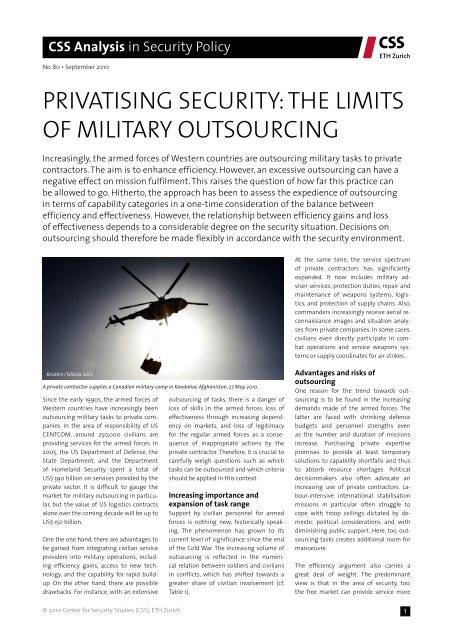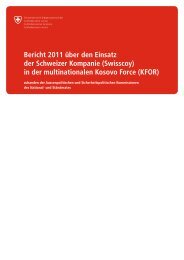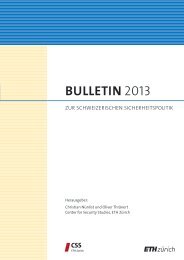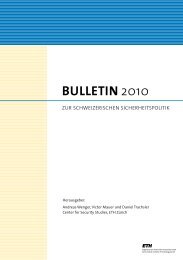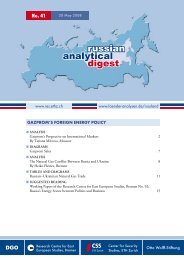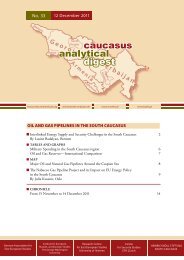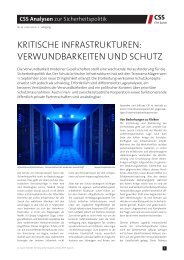English (PDF) - Center for Security Studies (CSS)
English (PDF) - Center for Security Studies (CSS)
English (PDF) - Center for Security Studies (CSS)
- No tags were found...
Create successful ePaper yourself
Turn your PDF publications into a flip-book with our unique Google optimized e-Paper software.
<strong>CSS</strong> Analysis in <strong>Security</strong> Policy No. 80 • September 2010efficiently and af<strong>for</strong>dably than the state.However, the size of savings thus gaineddepends on the factors taken into account<strong>for</strong> the calculation.The decisive questionis whetherthis calculationincludes the transactionalcosts and indirect savings thataccompany any restructuring, such asnon-incurred pension payments. In theshort term, outsourcing may serve to reducecosts, as only the costs of the privatecontractor’s service during the mission athand are incurred. As soon as the missionis over, expenses on personnel, housing,and supplies no longer accrue, unlike inthe case of military units. Initial efficiencygains, however, may be outweighed bycreeping cost increases on the side of theprivate contractor.Military units offer other advantages thatare more difficult to quantify. They can beused in manifold ways without change ofcontract. However, extensive outsourcingmay have a detrimental effect on the effectivenessof armed <strong>for</strong>ces. For instance,there is a risk that expertise may be lost,and a dependency on private contractorsmay arise. Also, if the security situationin a theatre of operations should deteriorate,providers of logistics and supportmay refuse to continue their services. Ifthe military is unable to take over thesetasks again, there may be negative repercussions<strong>for</strong> effectiveness. Another riskis that private contractors may displayunacceptable behaviour in an operationarea. If private security contractors kill orinjure civilians, it may be impossible tohold the company in question accountabledue to lack of oversight or legalframeworks, with a resulting loss of legitimacythat may have a negative effect ona mission.Against this background, defining the limitsof outsourcing becomes a matter of“Defining the limits ofoutsourcing becomes a matterof some urgency.”The ratio of civilians to soldiers in selected conflictssome urgency. In the US, the Commissionon Wartime Contracting created by theSenate in 2008 is tasked with debating thematter. In a hearing,three differentconcepts <strong>for</strong> definingthese limitswere discussed: Theconcept of state-inherent tasks, the conceptof core capabilities, and the conceptof mission-critical tasks.The concept of state-inherenttasksEvery society has certain conceptions ofwhich tasks are the mandatory prerogativeof the state. This approach postulates thatstate-inherent tasks should be handled bythe state, while the private sector can provideother services. The advantage of suchan arrangement is that it draws a clear distinction.If a given task is classified as inherent,it cannot be outsourced. However, thisconcept does not define the actual boundariesof such a distinction. For instance, theUS with its rather restrictive idea of thestate outsources considerably more tasks tothe private sector than most Western Europeancountries do. Among the classic stateinherenttasks in the area of security are offensivecombat operations, <strong>for</strong> example.This approach af<strong>for</strong>ds long-term planningsecurity to decision-makers. Furthermore,depending on where the boundary isdrawn, it also allows considerable savingsto be made. A narrow interpretation of thenotion of “state-inherent tasks” enhancesthe freedom of manoeuvre, while an extensiveinterpretation restricts it. The disadvantageof this concept is that the dangerof dependency on private contractors isparticularly acute. Even non-state-inherenttasks may be critical <strong>for</strong> fulfilling a mission.While medic services may not be strictly astate-inherent task, it is a necessary component<strong>for</strong> any army in fulfilling its mission. Ifsuch services are no longer provided by thecontractor and cannot be rapidly taken onConflict Civilians (contracted by the US) US soldiers RatioWorld War I 85,000 2,000,000 1:24World War II 734,000 5,400,000 1:7Vietnam War 70,000 359,000 1:5Iraq (1991) 5,200 541,000 1:104Balkans 20,000 20,000 1:1Iraq (2007) 190,000 160,000 1:0,8Afghanistan (2009) 74,000 55,000 1:0,7Iraq (2010) 95,000 95,000 1:1Sources: Congressional Research Service , Air Force Journal of Logistics .by the armed <strong>for</strong>ces themselves, the resultwill be a loss of effectiveness.The concept of core capabilitiesThe concept of core capabilities takes intoaccount that a capability, though it maynot be state-inherent, may nevertheless becritical <strong>for</strong> the accomplishment of a missionby the armed <strong>for</strong>ces. The limits of outsourcingthus depend largely on the missionsallocated to the armed <strong>for</strong>ces. Dependingon these missions, core capabilities are definedas capabilities that are indispensable<strong>for</strong> mission fulfilment. Thus, <strong>for</strong> instance,an army that is tasked exclusively with traditionalterritorial defence does not requirestrategic airlift capabilities. However, <strong>for</strong>armed <strong>for</strong>ces deployed on overseas missions,such capabilities are vital.This approach makes it possible to tailorthe outsourcing of tasks specifically to theneeds of the armed <strong>for</strong>ces. Capabilities aresubdivided into core and non-core capabilities,the latter of which may be entrusted tothe free market. This procedure preserves acertain degree of flexibility. Since the boundarybetween core and non-core capabilitiesis not defined by a normative idea of thestate, it can be adapted more easily whenthe mission changes. Efficiency gains aremoderate in this approach, however, sincethe category of core capabilities is broaderthan that of state-inherent capabilities.The positive aspect is that the danger ofdependency on the market is minor. Sinceoutsourcing decisions are geared towardsthe requirements of the armed <strong>for</strong>ces, theabsolutely indispensable capabilities mustbe available under any conditions. The potentialloss of effectiveness in case a privatecontractor should fail to provide is there<strong>for</strong>eless than in the concept of state-inherenttasks. It can nevertheless be considerable,since it is not only core capabilities that aredecisive <strong>for</strong> the success of a mission.The concept of mission-criticalcapabilitiesThe concept of mission-critical capabilitiesaims to ensure the independent provisionof all capabilities that are crucial <strong>for</strong> thesuccess of a mission. For instance, trainingtasks are not core tasks, but in the case ofstabilisation and nationbuilding missions,they are critical <strong>for</strong> success. This approachis based on the question of which missions(traditional warfighting scenarios, peacekeeping,nationbuilding, etc.) the armed<strong>for</strong>ces should carry out and which capabilitiesare required <strong>for</strong> doing so. This approachensures a high degree of effectiveness,© 2010 <strong>Center</strong> <strong>for</strong> <strong>Security</strong> <strong>Studies</strong> (<strong>CSS</strong>), ETH Zurich 2
<strong>CSS</strong> Analysis in <strong>Security</strong> Policy No. 80 • September 2010Switzerland and outsourcing of security tasksThe federal administration as contracting entityNumerous federal agencies make use of the service of private security contractors.The use of private security contractors by federal agencies is regulated by law.Switzerland as company domicileThere is no national register at the federal level or licensing regulation <strong>for</strong> private securitycontractors domiciled in Switzerland. In 2008, the Federal Council decided not to introducea mandatory registration and licensing system.In spring 2010, an international security contracting firm moved its company headquartersto Basel, prompting the Federal Council to revisit the issue.From the point of view of neutrality law, there are no obstacles to companies being domiciledin Switzerland.Diplomatic activitiesAn initiative launched by the Swiss Federal Department of Foreign Affairs (FDFA) and the InternationalCommittee of the Red Cross in 2006 led to the approval of the “Montreux Document”in 2008. This contains an overview of the obligations of private security companiesunder international law and good practices. The legally non-binding document is supportedby 35 states.The FDFA supports the ef<strong>for</strong>ts of the private security contractor trade to elaborate a code ofconduct. This is to include an accountability mechanism. The code is to be agreed be<strong>for</strong>e theend of 2010.since the armed <strong>for</strong>ces can act relatively independentlyof the free market. Conversely,there is less opportunity <strong>for</strong> reducing costsand realising efficiency gains, since mission-criticalcapabilities are even more comprehensivelydefined than core capabilities.These three approaches are not mutuallyexclusive. In practice, a hybrid <strong>for</strong>m includingall these options is frequently applied.The question remains which criteria shouldultimately determine decisions on outsourcing.For instance, if logistics are regarded asa non-state-inherent task, considerable savingscan be made during peacetime. However,during combat operations, such a capabilitymay prove to be mission-critical.The approaches presented here have a commondeficiency in that a categorical separationof capabilities does not allow a flexibleweighting of advantages and disadvantagesof outsourcing, but instead <strong>for</strong>ces decisionmakersat an early stage to decide betweenefficiency and effectiveness.The security situation as adecisive factorIt may be helpful not to link outsourcingdecisions directly to capability categories,but to make them dependent on the securitysituation and the place where servicesare to be provided. In this approach, too, anindispensable element would be to definea core of state-inherent tasks that cannotbe outsourced. Even under a highly restrictiveinterpretation, this would includeplanning and carrying out combat operations.All other tasks could be outsourced,but only to a certain degree. The armed<strong>for</strong>ces must sustain sufficient own capabilitiesin every area to be able, if need be,to carry out a task on their own. The decisionon outsourcing would be based mainlyon external framework conditions.The decisive criterion would be the securitysituation: The more unstable a security situationis, the higher the probability of negativeconsequences. Examples from Iraq showthat the danger oflogistics providers refusingservices growsas the situation becomesincreasinglyunstable. Since servicerefusal causes a decline of effectiveness,logistics in instable regions must be providedby the armed <strong>for</strong>ces. Logistics can be outsourcedwhere the security situation is stable,<strong>for</strong> instance in the home country or onthe way to the theatre of operations. In thetheatre of operations, outsourcing is possiblewhere the security situation permits.With private security companies, unlike logisticsand support service providers, thedanger of service refusal is quite low evenunder conditions of instability. The dangerhere is rather that they are more likely tomake use of weapons and kill or injure civilians.Since legal oversight is often lacking incombat zones, and private contractors thusoften remain free from supervision or legalaccountability, the legitimacy of the entiremission may be compromised by such incidents.This is particularly serious in the caseof stabilization missions that are predicatedon winning the support of the population.“Such a situation-dependentapproach would make it possibleto gain efficiency without significantloss of effectiveness.”Under this approach, protection dutiescould only be outsourced to private companiesin stable regions, in the home country,or on the way to the theatre of operations,where sufficient judicial oversight could beensured.The flexibility of such an approach couldbe increased if outsourcing was also facilitatedin an unstable environment dependingon the place where the service was tobe provided. A distinction would have tobe made between services provided withina camp or secured zone and outside of it.Within such a perimeter, a certain degreeof stability and oversight of civilians couldbe guaranteed. Refusal of service by logisticsand support contractors would be relativelyunlikely. Also, it would be possible tosupervise private security companies hired,<strong>for</strong> instance, to provide guard duty. Outsideof the camp, resupply and protection dutieswould have to be carried out by thearmed <strong>for</strong>ces; otherwise, the danger of losingeffectiveness would be too great. Suchan arrangement would make it possible toachieve efficiency gains even in unstable regionsthrough outsourcing.Such a situation-dependent approachwould allow limited flexibility. Nearly allcapabilities with the exception of stateinherenttasks could be outsourced if thesecurity situationpermitted. The extentof cost savingsachieved would likelybe less than underthe other approachesdiscussed above, since that armed <strong>for</strong>ceswould need to retain the necessary capabilitiesto provide the required tasks on theirown and replace private contractors whenrequired. However, this approach wouldmake it possible to gain efficiency withoutsignificant loss of effectiveness, since thebalance between outsourcing and own contributioncan be adapted according to thesituation at hand.Author: Ulrich Petersohnpetersohn@sipo.gess.ethz.chResponsible editor: Daniel Trachslersta@sipo.gess.ethz.chTranslated from German:Christopher FindlayOther <strong>CSS</strong> Analyses / Mailinglist:www.sta.ethz.chGerman and French versions:www.ssn.ethz.ch© 2010 <strong>Center</strong> <strong>for</strong> <strong>Security</strong> <strong>Studies</strong> (<strong>CSS</strong>), ETH Zurich 3


